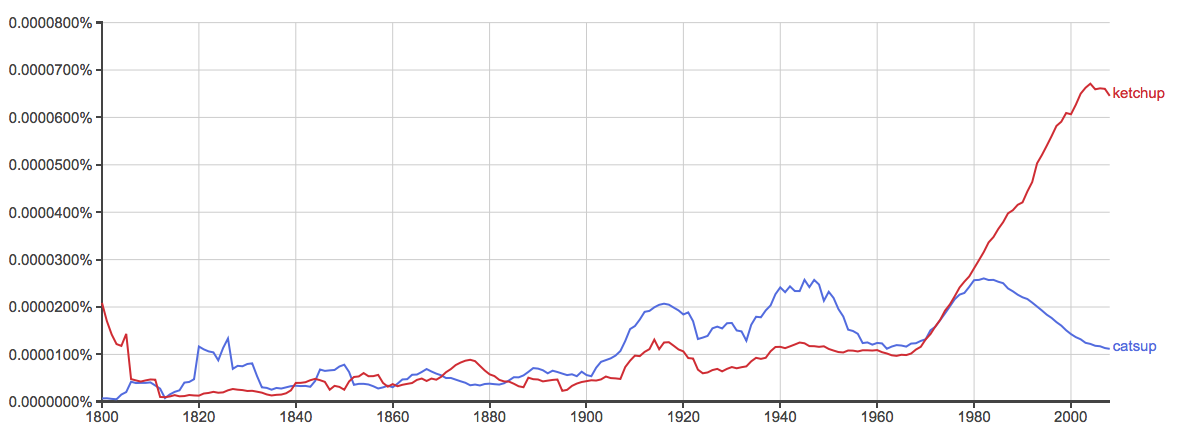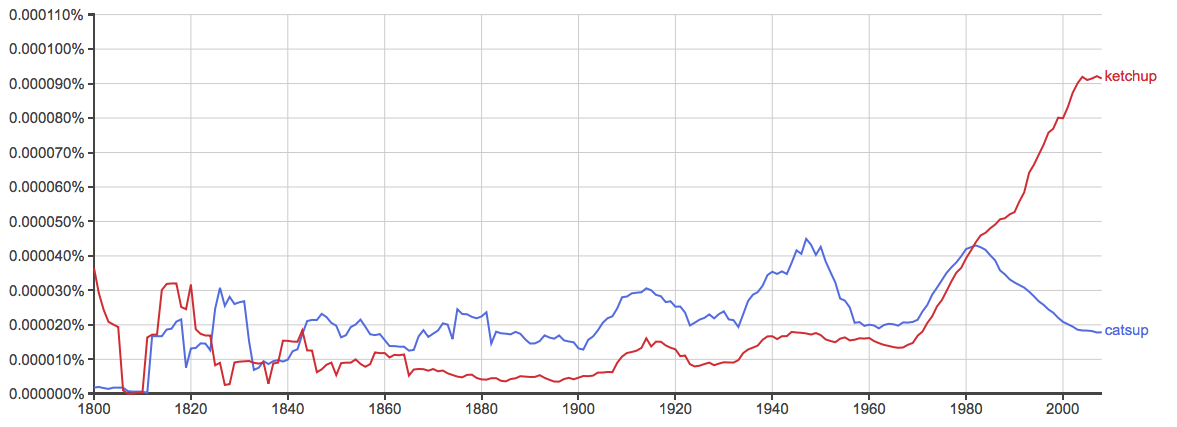How exactly do you spell everyone’s favorite French fry condiment? It is catsup or ketchup?
Some people say their taste is different; some say their ingredients are different; and some say they are exactly the same. What is the truth?
What is the Difference Between Catsup and Ketchup?
Catsup and Ketchup are two different spellings of the same condiment, which, today, is a Westernized version of a condiment first introduced to European traders in the late 17th century.
During their time trading in the Far East, British sailors of the 1600s developed a taste for the delicious treat we now call ketchup and began exporting it to the West.
The word itself is thought to come from the Cantonese k’ē chap or the Malay kēhap, both of which refer to a kind of fish sauce. Ketchup was originally a paste made from fermented fish guts (yes, it’s come a long way).
When to Use Ketchup
Ketchup is the dominant spelling in both American and British English by a large margin. It’s interesting to note, however, that this wasn’t always the case in America (more on that below).

The above graph charts the use of ketchup vs. catsup over time, and, as you can see, ketchup is used much more frequently than is catsup. If you are a writer in any English speaking country today, ketchup is the spelling you will want to use.
Ketchup is the spelling modern speakers and writers are accustomed to seeing. Plus, as Garner’s Modern American Usage Dictionary states, ketchup has the added advantage of phonetically approximating and of most closely resembling the word’s probable source (k’ē chap / kēhap).
But, interestingly enough, if we examine the graph of catsup vs. ketchup, we can see that the preference for ketchup, all things considered, a relatively recent trend, starting sometime in the mid-to-late 1900s.
History of Ketchup in America
Believe it or not, catsup was once the dominant spelling in America, and it really wasn’t that long ago that this was the case.
The graph below separates books published just in American English, and, as you can see, it wasn’t until the mid-to-late 1900s that ketchup overtook catsup as the preferred spelling.

So, why the change in preference? Well, the first thing you need to remember is that the tomato-based ketchup we now use today wasn’t always how ketchup was made.
Tomatoes weren’t actually added to ketchup until the 19th century. This tomato-based variety quickly caught on in the United States during the first few decades of the 1800s, but was primarily produced by small, local farmers. No company was distributing nationally until at least 1837.
In other words, there was no national brand that people could identify and symbolize as ketchup, which led to no one ketchup company’s spelling catching on as the industry standard. Whether it was spelled ketchup or catsup was anybody’s guess.
Enter Heinz
Heinz, a name now synonymous with ketchup, was actually somewhat of a latecomer to the tomato-based ketchup industry.
 The company did not release its own branded ketchup until 1867, well into the 19th century. Its original branding was “Heinz Tomato Catsup,” but, sometime in the 1880s, the company rebranded itself as “Heinz Tomato Ketchup” as a way to stand out from its competition.
The company did not release its own branded ketchup until 1867, well into the 19th century. Its original branding was “Heinz Tomato Catsup,” but, sometime in the 1880s, the company rebranded itself as “Heinz Tomato Ketchup” as a way to stand out from its competition.
As Heinz increased its market share throughout the 1900s, its name—and more importantly its spelling—became associated with the tomato-based condiment.
Eventually, consumer demand for ketchup began to outweigh the demand for catsup, and it was clear that other companies must rebrand or lose more market share.
In 1988, Del Monte switched its branding to be ketchup for that very reason: it became clear that ketchup was the spelling choice of the American consumer.
There are other theories that try to explain the catsup vs. ketchup battle, but most are unfounded or based on misinformation. Slate Magazine nicely summarizes a few of the more popular explanations and explains why there isn’t much support for them.
When to Use Catsup
 Given the widespread preference for ketchup over catsup, there is really only one reason to still use catsup in your writing.
Given the widespread preference for ketchup over catsup, there is really only one reason to still use catsup in your writing.
If the product name includes catsup as its spelling, you obviously want to use the correct name of the company’s product. In such a case, catsup would be serving as a proper noun.
Summary
Throughout the 19th century, the ketchup vs. catsup battle was waged on the written page as well as in the consumer marketplace.
Ketchup eventually won out, and it is the preferred spelling in all of English speaking world.
Contents
